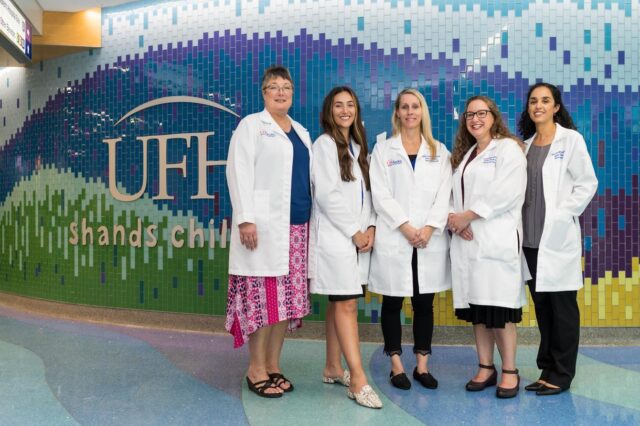UF Health opens midwifery practice

Chelsea Stump developed a bond with the obstetrician who delivered her first baby almost six years ago. As a new mother-to-be, the Gainesville woman sought the reassurance of a doctor’s expertise.“My doctor was very caring,” Stump said. “It was a fabulous experience.”
For her second child, she turned to a profession with ancient roots after doing research and talking to other mothers. She didn’t reject her obstetrician’s care. Rather, she embraced an alternative that felt comfortable to her — a University of Florida Health midwife.
“The midwives make you feel like you’re part of their family,” said Stump, whose second and third children were born at UF Health. “It seemed like a more natural, less medically involved experience of birth.”
UF Health, recognizing a need for midwives as a safe option for uncomplicated pregnancies, recently opened a new practice, the UF Health Midwifery Group, to further personalize pregnancy care while offering the resources of a major hospital system for consultation or in the rare instances when complications arise.
The midwifery practice began seeing a limited number of patients in September for low- and average-risk pregnancies. Midwives are seeing patients at UF Health Women’s Centers at Springhill, Medical Plaza and Heath Brook in Ocala.
Midwifery care has previously been available at UF Health, but with a limited number of midwives and never set up as an independent practice.
“It’s been one of our dreams to establish an evidence-based, professional and structured midwifery practice,” said John C. Smulian, M.D., M.P.H., chair of the UF College of Medicine’s department of obstetrics and gynecology.
“We wanted to create a practice for midwives so they could see their own patients and offer their expertise through the entire pregnancy,” Smulian added. “We’ve seen a desire for this service in the community. Mothers have done their research and they know what they want. We’re hearing that call and want to empower them.”
A regional survey recently conducted by UF Health showed great interest in the community for a hospital-based midwifery service, he noted.
The practice has launched with five state-licensed, certified nurse-midwives, or CNMs, with extensive experience. The team will eventually expand to seven. Smulian said he hopes the practice will reach up to 400 deliveries annually in the next four to five years.
Services include prenatal care and education, family planning and birth control, pre-conception counseling, routine gynecology care, breast exams, breastfeeding support, labor and delivery, and postpartum care.
Births take place at UF Health Shands, where a range of specialist physicians are always available should complications arise during delivery. Doctors also can be consulted at any point in the months leading up to the birth, Smulian said, as midwives partner with moms-to-be for informed, shared decision-making about their health care choices.
“A midwife is taking care of you because you are low risk,” said Natalia Prieto, APRN, DNP, CNM, the lead midwife in the UF Health midwifery practice with 5,000 deliveries under her belt. “But in an emergency, I can call up or press a button to get a doctor in the room immediately.”
Indeed, that hospital connection is important to mothers like Stump. “My husband and I felt a midwife was a comfortable next step where it was almost like having a home birth, but we still have all this medical expertise available if we need it,” Stump said.
Prieto noted that the training of UF Health midwives is extensive. They have college degrees in nursing and a master’s or doctorate in nursing, with a specialty in midwifery. They must pass a national certification exam.
Midwives typically spend more time with mothers during the entire pregnancy. Indeed, UF Health midwives said they often develop lasting relationships.
“We get to spend a little more time with them during their visits,” said UF Health midwife Amanda Husband, APRN, CNM. “We spend a lot of time educating, getting to know their family, getting to see if there are any social risk factors like food insecurity. We can see early on if they need some other type of support.”
A common misunderstanding of midwifery is that it is always an all-natural experience, without pain management such as an epidural and without the option of Cesarean delivery, said Prieto. Midwifery support is still available for both, even though a physician would be involved in care prior to and on the day of delivery.
“We can still be there for the mother throughout the process,” she said.
Midwifery has a long history. The International Confederation of Midwives notes that its roots date to at least 3,500 B.C., with Egyptian and Roman-Greco tradition recognizing midwifery as an autonomous, respected profession.
Modern studies show that midwife-attended births are as safe as those performed by obstetricians when the midwives are well-trained and when they have the resources needed to provide quality care. A 2019 editorial in Scientific American said midwives should be integrated into the U.S. medical system to provide safe, less expensive maternity care.
Evidence indicates, Husband said, that midwifery care has been shown to improve outcomes in breastfeeding and lead to fewer interventions, fewer pre-term deliveries and fewer low-birth weight babies.
“We’re partnering with women in the community to help improve outcomes, to educate them and support them throughout their pregnancy, to be really with them on this journey,” she added.
Indeed, the word “midwife” is rooted in Old English, with “mid” and “wif” being, respectively, archaic forms of “with” and “woman.”
About the author
